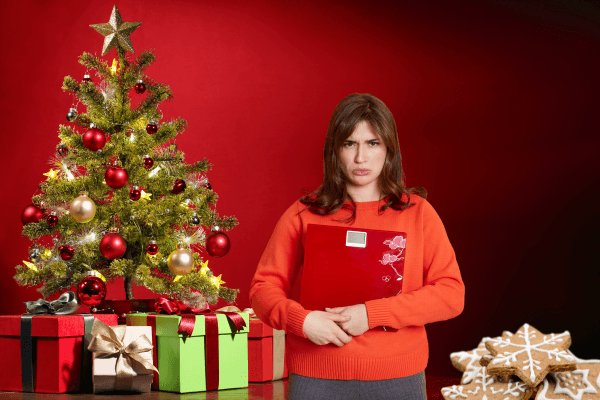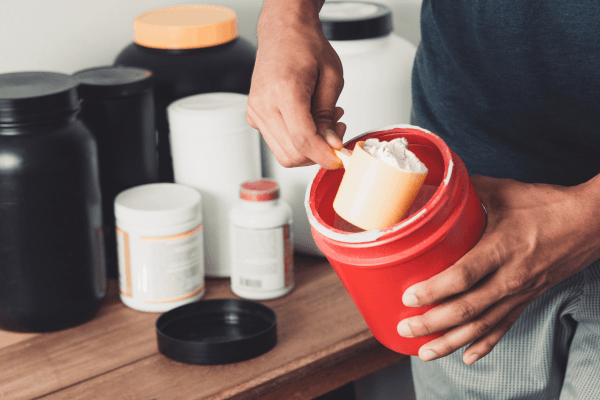Christmas is right around the corner! There’s an infectious vibe of joy, fun, and frolic in the air. You might stumble upon various Christmas delicacies at your street corner, or as you celebrate a Christmas potluck with university friends or office colleagues. It is definitely a time of year when most people look forward to presents and social gatherings. However, this joyful time of year also tends to mark a pause in your dieting routine.
If you resonate with this, you are likely aware that it can lead to weight gain. Is it possible to prevent this “Christmas weight gain”?
Yes, there is! However, it’s important to shift your focus from a weight-focused mindset to a healthy eating mindset for long-term benefits that don’t compromise your relationship with food.
The reality check on holidays – Isn’t Christmas weight gain normal?
1. Your circadian rhythm is disrupted
Winter time brings with it longer evenings and shorter days. The circadian rhythm which is the body’s internal clock, dictates the body’s pattern of physical, mental and emotional changes. Due to the change in season, the body takes time to get adjusted to the new routine of staying indoors and the reduced amount of daylight available. Your mood changes as you might feel the urge to sleep longer and take rest. Seasonal Affective Disorder (SAD) is also common in winter.
2. Your metabolic rate is higher in winter
In winter, your metabolism tends to be higher as the weather becomes colder. Colder temperatures increase your Basal Metabolic Rate (BMR) causing you to burn more calories and develop a larger appetite. Due to evolution, humans have a tendency to store fat in Winter. It is also a fact that the types of produce available are rather scarce. Cravings for starchy and high calorie foods tends to increase.
3. Your physical activity is lower
In winter, the motivation and energy to work out are reduced, not to mention the concern for safety, as the roads are slippery and the weather is harsh. This is especially true if you are used to exercising outdoors or at the gym. Lack of motivation can make you feel depressed and lead to lying in bed. The holiday chores and festivities can also disrupt your usual routine.
4. You indulge in alcohol
During Christmas, there is a pattern of a drinking culture. Beverages like eggnog, mulled wine, and hot toddies are some of the favourite drinks at holiday parties. Alcohol also induces vasodilation and increases your body temperature, making you feel warm. So, this is primarily an environmental influence of culture. Additionally, there is an increase in alcohol advertisements aimed at promoting joy during the season of Christmas.
Do you know how many calories you consume on average on Christmas?
Even though people may gain weight during Christmas due to multiple reasons, the lifestyle followed during this time is more relaxed, with many letting go of their usual routines. A study revealed that, an individual consumes an average of 6,000 Kcal on Christmas day. This is triple the average daily calorie intake recommended for an individual. There is a wide variety of food on the Christmas table, larger portions, heavy alcohol intake, and no restrictions on calories.
How long does it take to lose the holiday weight gain?
If you are someone who thinks you can jump back on the bandwagon after Christmas and New Year, think again!
It may be difficult to get back on track after a long break. A study on holiday weight gain revealed that an individual may gain an average of 2.3kg or more during Thanksgiving and Christmas period. The weight of 195 adults was measured before the holidays, during the holidays, and after the holidays. When these individuals were weighed again in February and March, it was observed that they had gained 4 times their actual holiday weight gain. This Christmas weight gain was not reversed.
Health hacks to avoid sudden Christmas weight gain
Here is your guide to avoid Christmas weight gain:
Before the holidays
1. Delay your Christmas food shopping
If you are someone who likes buying your Christmas goodies early, try delaying your Christmas food shopping this year. Buying holiday foods too early can lead to bulk buying, which may result in unnecessary temptation. So, push your grocery shopping closer to Christmas day. This can help you resist the urge to overeat your favourite holiday snacks and also give you enough time to plan your Christmas shopping list more thoughtfully.
2. Keep your favourite holiday snacks out of sight
If you do end up buying your favourite Christmas snacks early on, store them in places you visit less frequently or in spots that require extra effort to access. Sometimes, motivation can be overemphasised, but the truth is, when you don’t spot high-calorie food often, your temptation decreases.
3. Make physical activity your family’s new festive hobby
Activities like gingerbread house making, icing cookies, or baking a rich plum cake etc. are important moments of family bonding. However, delaying these to Christmas week can help balance out your family’s calorie consumption. Playing indoor games, going for a walk with the dog, or turning on some fun Christmas music and dancing your hearts out are also great ways to bond while staying active. You could also try an indoor heated pool for variety.
During the holidays
4. Be conscious of your food portions
During Christmas, the temptation to choose larger portions of holiday dishes is high. However, remind yourself to practise portion control. Choose to fill your plates with protein and fibre rich food. Listen to your body’s signals and try smaller servings instead of large portions. It is better to serve yourself rather than have a loved one serve you as you can control the quantity you eat. Do enjoy your favourite drinks and baked desserts but without overindulging.
5. Choose a new family Christmas ritual
Food is for sure an important aspect of family bonding. Sharing food and eating together does make your love grow. However, it is never too late to shift the focus from food to other family hobbies. Enjoy watching Christmas movies, decorating the house and garden for Christmas etc. as fun holiday rituals.
6. Make healthy and delicious food substitutes easily accessible
Choosing food substitutes like yoghurt over cheese or vegetable chips over regular chips are good ways to make healthy food choices. Keeping these alternatives easy to reach can help you enjoy Christmas while focusing on your health goals.
After the holidays
7. Have a backup action plan for January
The earlier, the better! If you do gain a bit of holiday weight, it is completely alright. Ensure you have an action plan with a workout schedule and a basic meal plan. Stock up on healthy snacks and distribute any leftover Christmas goodies. Joining an exercise class under a certified fitness trainer is also a great choice to ease into your New Year’s fitness goals. If you have an old routine, following it does help getting back on track.
8. Take help
If you feel you need some help managing your Christmas weight gain, consider speaking to a dietitian, doctor or fitness trainer. These experts can provide you with the necessary support and guidance to help you achieve your health and fitness goals.
Mayuri,
Dietetic Researcher, Simplyweight





